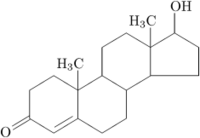Testosterone
Testosterone is a steroid hormone from the androgen group. Testosterone is secreted in the testes of men and the ovaries of women. It is the principal male sex hormone and the "original" anabolic steroid. In both males and females, it plays key roles in health and well-being. Examples include enhanced libido, energy, immune function, and protection against osteoporosis. more...
Sources of testosterone
Like other steroid hormones, testosterone is derived from cholesterol. The largest amounts of testosterone are produced by the testes in men, but it is also synthesized in smaller quantities in women by the theca cells of the ovaries, by the placenta, as well as by the zona reticulosa of the adrenal cortex in both sexes.
In the testes, testosterone is produced by the Leydig cells. Due to the dual function of the male gonad, testosterone directly influences spermatogenesis. Like most hormones, testosterone is supplied to target tissues in the blood where much of it is transported bound to a specific plasma protein, sex hormone binding globulin (SHBG).
Mechanism of effects
The effects of testosterone in humans and other vertebrates occur by way of two main mechanisms: by activation of the androgen receptor (directly or as DHT), and by conversion to estradiol and activation of certain estrogen receptors.
Free testosterone (T) is transported into the cytoplasm of target tissue cells, where it can bind to the androgen receptor, or can be reduced to 5α-dihydrotestosterone (DHT) by the cytoplasmic enzyme 5α-reductase. DHT binds to the same androgen receptor even more strongly than T, so that its androgenic potency is about 2.5 times that of T. The T-receptor or DHT-receptor complex undergoes a structural change that allows it to move into the cell nucleus and bind directly to specific nucleotide sequences of the chromosomal DNA. The areas of binding are called hormone response elements (HREs), and influence transcriptional activity of certain genes, producing the androgen effects.
Androgen receptors occur in many different vertebrate body system tissues, and both males and females respond similarly to similar levels. Greatly differing amounts of testosterone prenatally, at puberty, and throughout life account for a large share of biological differences between males and females.
The bones and the brain are two important tissues in humans where the primary effect of testosterone is by way of aromatization to estradiol. In the bones, estradiol accelerates maturation of cartilage into bone, leading to closure of the epiphyses and conclusion of growth. In the central nervous system, testosterone is aromatized to estradiol. Estradiol rather than testosterone serves as the most important feedback signal to the hypothalamus (especially affecting LH secretion). In many mammals, prenatal or perinatal "masculinization" of the sexually dimorphic areas of the brain by estradiol derived from testosterone programs later male sexual behavior.
Effects of testosterone on humans
In general, androgens promote protein synthesis and growth of those tissues with androgen receptors. Testosterone effects can be classified as virilizing and anabolic effects, although the distinction is somewhat artificial, as many of the effects can be considered both. Anabolic effects include growth of muscle mass and strength, increased bone density and strength, and stimulation of height growth and bone maturation. Virilizing effects include maturation of the sex organs, particularly the penis and the formation of the scrotum in fetuses, and after birth (usually at puberty) a deepening of the voice, growth of the beard and torso hair. Many of these fall into the category of male secondary sex characteristics. Increased testosterone causes deepening of the voice in both sexes at puberty. To take advantage of its virilizing effects, testosterone is often administered to transmen (female-to-male transsexual and transgender people) as part of the hormone replacement therapy, with a "target level" of the normal male testosterone level. And like-wise, male-to-female transsexuals are prescribed drugs to decrease the level of testosterone in the body and allow for the effects of estrogen to develop. Testosterone is also often used by bodybuilders to enhance muscle build.
Read more at Wikipedia.org



